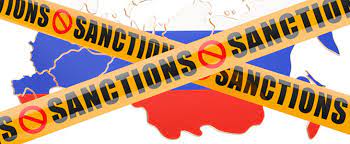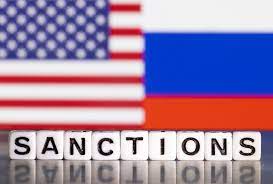Russian Sanctions Update: Five Months into the War in Ukraine

Jessica Sanderson, Partner at The Volkov Law Group, re-joins us for a posting on the current state of sanctions against Russia. Jessica can be reached at [email protected].
It’s been five months since Russia invaded the Ukraine, and the United States has imposed a succession of increasingly severe economic sanctions on Russia and Belarus. A recent study published by Jeffrey Sonnenfeld, a Professor in the Practice of Management at Yale School of Management and four of his colleagues at the Executive Leadership Institute (affiliated with Yale), found that “business retreats and sanctions are catastrophically crippling the Russian economy.” As harmful as these sanctions have been in Russia, the repercussions of these trade sanction are being felt in all countries, including here at home in the U.S. Participants in the global economy are struggling to find alternatives to Russian business partners and exports, and we are all grappling with the rapidly changing sanctions laws. While it presently remains lawful to transact some business with certain Russian counterparties in limited sectors of the economy, a license is now necessary for most trade with Russia outside of the civilian and humanitarian areas of agriculture and medicine.
Below is a summary of the significant U.S. sanctions against Russia, Belarus and their citizens imposed in the last five months. If your business involves any of these sectors, entities, or individuals, we encourage you to consult the most up-to-date sanctions regulations and lists, and to carefully consider the attendant legal, commercial, and reputation risks.
Since February 21, 2022: (i) President Biden has issued four Executive Orders restricting trade with and investment in Russia (EOs 14065, 14066, 14068, and 14071), (ii) the Biden administration signed two bills into law – the “Ending Importation of Russian Oil Act” (H.R. 6968), which prohibits energy imports from Russia, and the “Suspending Normal Trade Relations with Russia and Belarus Act” (H.R. 7108), which suspends normal trade relations with Russia and Belarus and raises tariffs on products from Russia or Belarus; (iii) the Department of Treasury’s Office of Foreign Assets Control (OFAC) published the “Russian Harmful Foreign Activities Sanctions Regulations, 31 CFR part 587, and issued four new “directives,” five “determinations,” and nearly forty Russia-related general licenses and Ukraine General Licenses authorizing otherwise prohibited transactions (e.g., wind-downs); and (iv) OFAC has published more than 180 frequently asked questions (FAQs) regarding the Russian Harmful Foreign Activities Sanctions (see Russian Harmful Foreign Activities Sanctions FAQ Topic Page).

In the five months between February 21, 2022 and the date of this article, the United States has:
- banned the import of Russian crude oil, petroleum products, liquefied natural gas, coal, gold, diamonds, seafood, and alcoholic beverages;
- suspended normal trade relations with Russia and Belarus and increased tariffs on otherwise permissible imports from those countries;
- added hundreds of Russian individuals, including Putin, Lavrov, Security Council members, politicians, government officials and ministers, oligarchs, business executives, and their family members to the Specially Designated Nationals and Blocked Persons List (SDN List), which means that U.S. persons are prohibited from engaging in any transactions with them and must block any property in their possession or under their control in which an SDN has an interest;
- imposed blocking sanctions on Russia’s largest banks, including Sberbank, VTB Bank, VEB, Alfa Bank, and the Russian Direct Investment Fund;
- imposed blocking sanctions on dozens of Russian entities including Rostec, Alrosa, Severstal, United Shipbuilding Corporation, Nord Stream 2 AG (the parent company for the natural gas pipeline project), and several aerospace, marine, electronics, defense, and virtual currency mining companies (a search by country for the Russian Federation in the automated Consolidate Screening List Search Engine, which lists parties for which the U.S. Government maintains restrictions on certain exports, reexports, or transfers of items, yields more than 2460 results for sanctioned entities and individuals, and this does not even include all entities owned 50% or more in the aggregate by sanctioned parties that may be sanctioned but not listed);
- restricted transactions with the Central Bank of Russia, the National Wealth Fund of the Russian Federation, and the Ministry of Finance of the Russian Federation (a general license authorized certain energy-related transactions);
- imposed restrictions on secondary-market transactions by U.S. financial institutions in Russian sovereign debt;
- restricted new equity investment and financing for major Russian companies including Gazprom, Sovcomflot, and Russian Railways;
- expanded the license requirements on export controls applied to Russia and Belarus to all items on the Commerce Control List (CCL);
- expanded export controls targeting Russia’s defense, oil refining, aerospace, energy, and maritime sectors;
- restricted Russian access to technology (e.g., semiconductors, computers, telecommunications, information security equipment, lasers, and sensors) by controlling U.S. exports or exports from third countries that use U.S. inputs such as equipment or software (the Foreign Direct Product Rule);
- imposed a ban on the export of U.S. luxury goods and dollar-denominated banknotes;
- prohibited Russian aircraft from entering U.S. airspace, and prohibited Russian vessels from entering U.S. ports;
- imposed visa restrictions on thousands of Russian military officers, government officials, and other individuals;
- imposed blocking sanctions on several Belarusian individuals and entities (a search by country for Belarus in the automated Consolidate Screening List Search Engine yields almost 200 results for sanctioned entities and individuals); and
- prohibited most transactions and activities with individuals and entities in the Russian-occupied Donetsk, Luhansk, and Crimea regions of Ukraine.

Notably, the EU, the United Kingdom, and other countries including Switzerland, Canada, Australia, New Zealand, Japan, South Korea, Singapore, and Taiwan have imposed similar sanctions against Russia as punishment for its invasion of Ukraine and to thwart Russia’s ability to continue its aggression.
We all sincerely hope the war will end soon. In the meantime, we will continue to monitor the expanding economic trade sanctions and import/export controls landscape.
















1 Response
[…] Source link […]